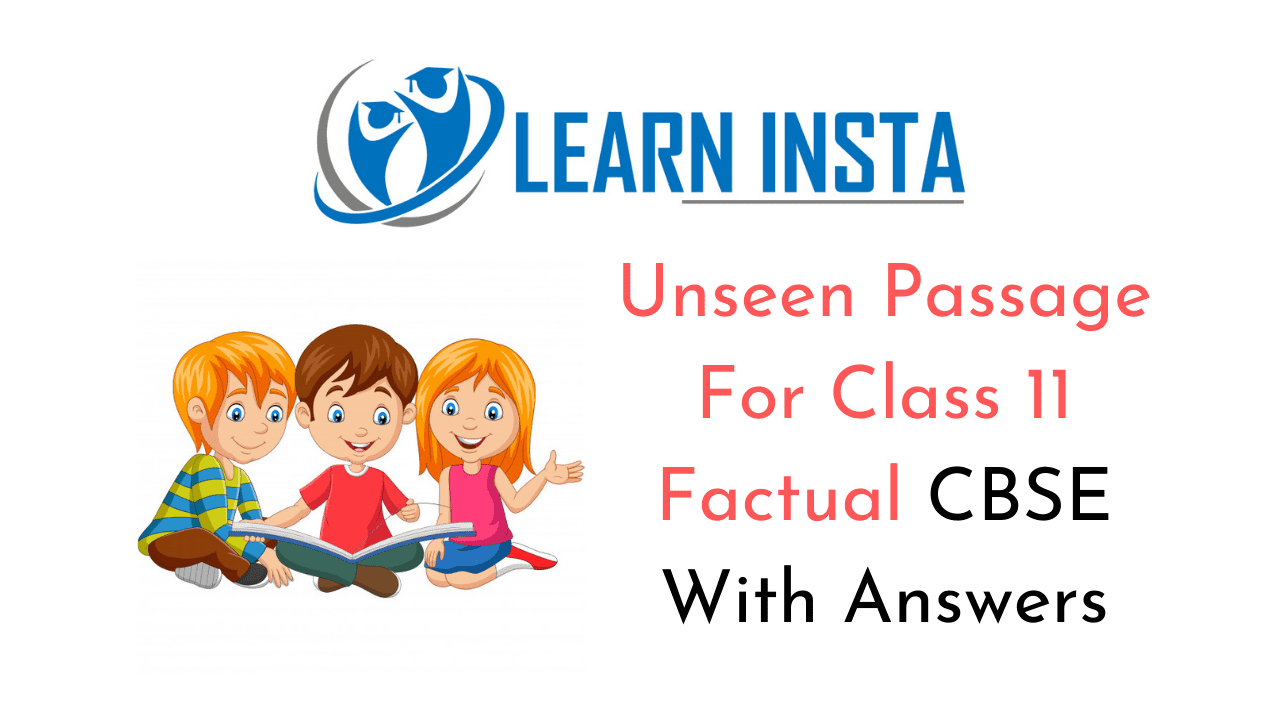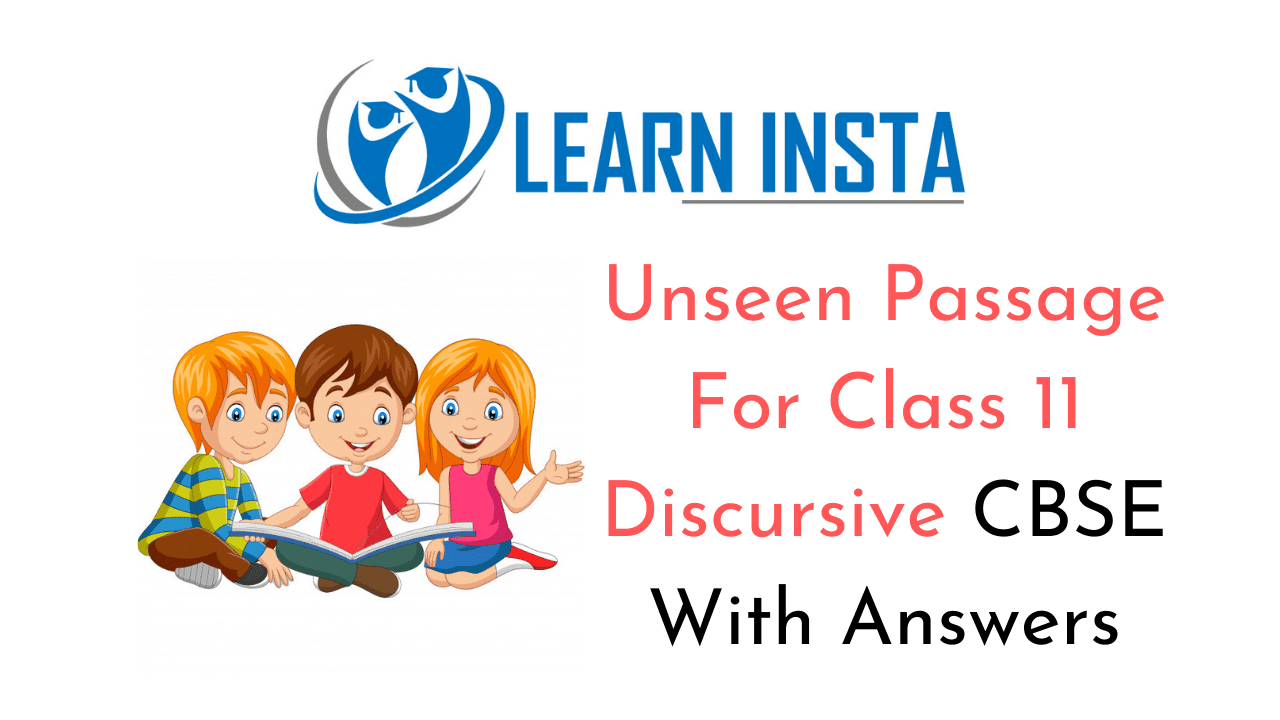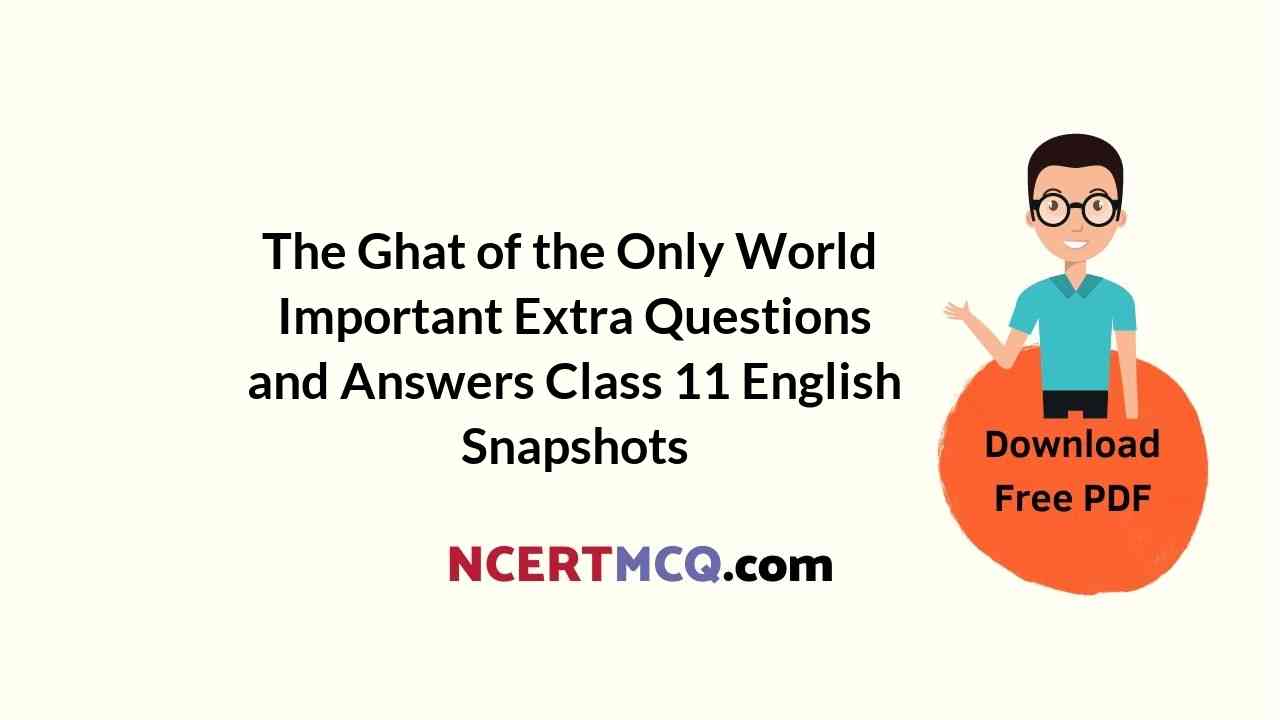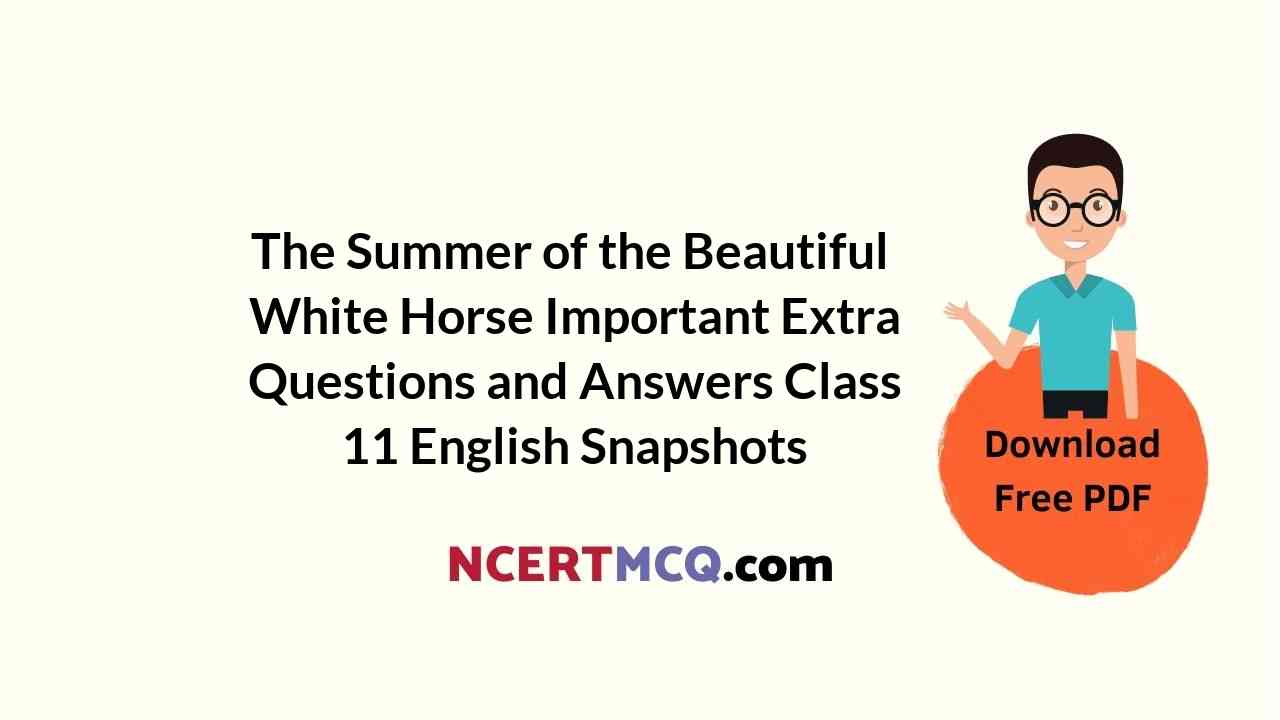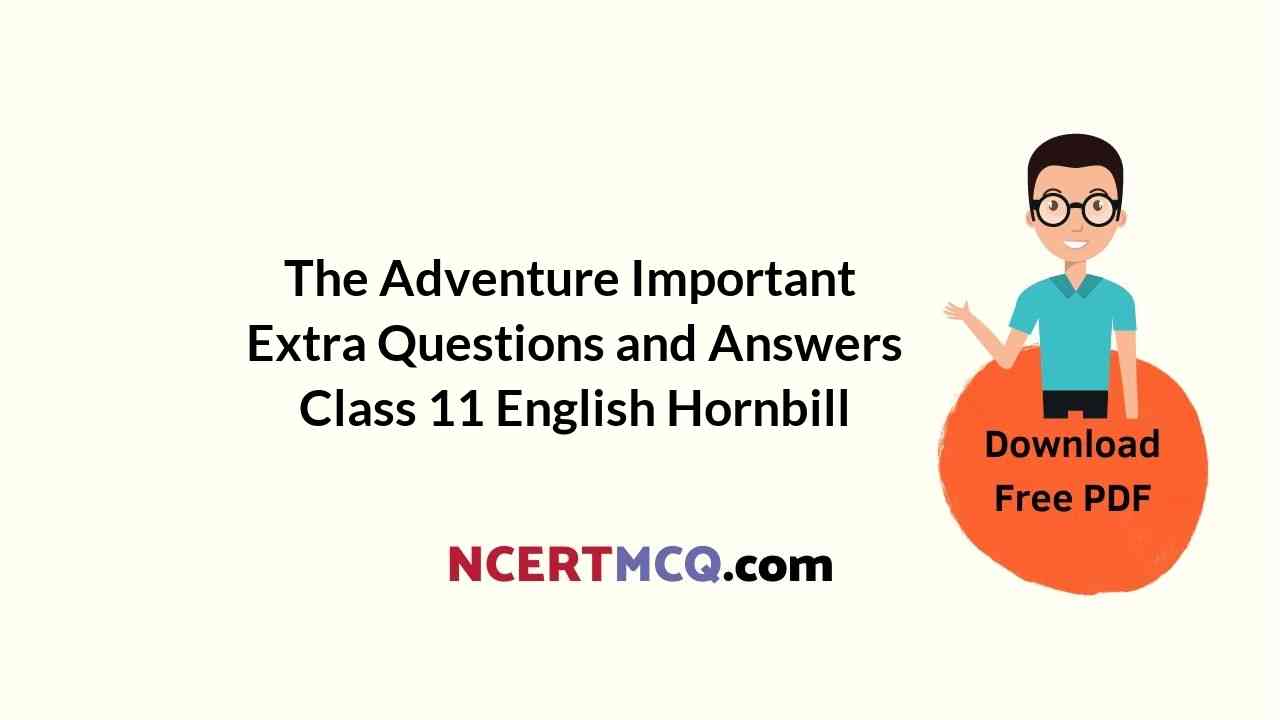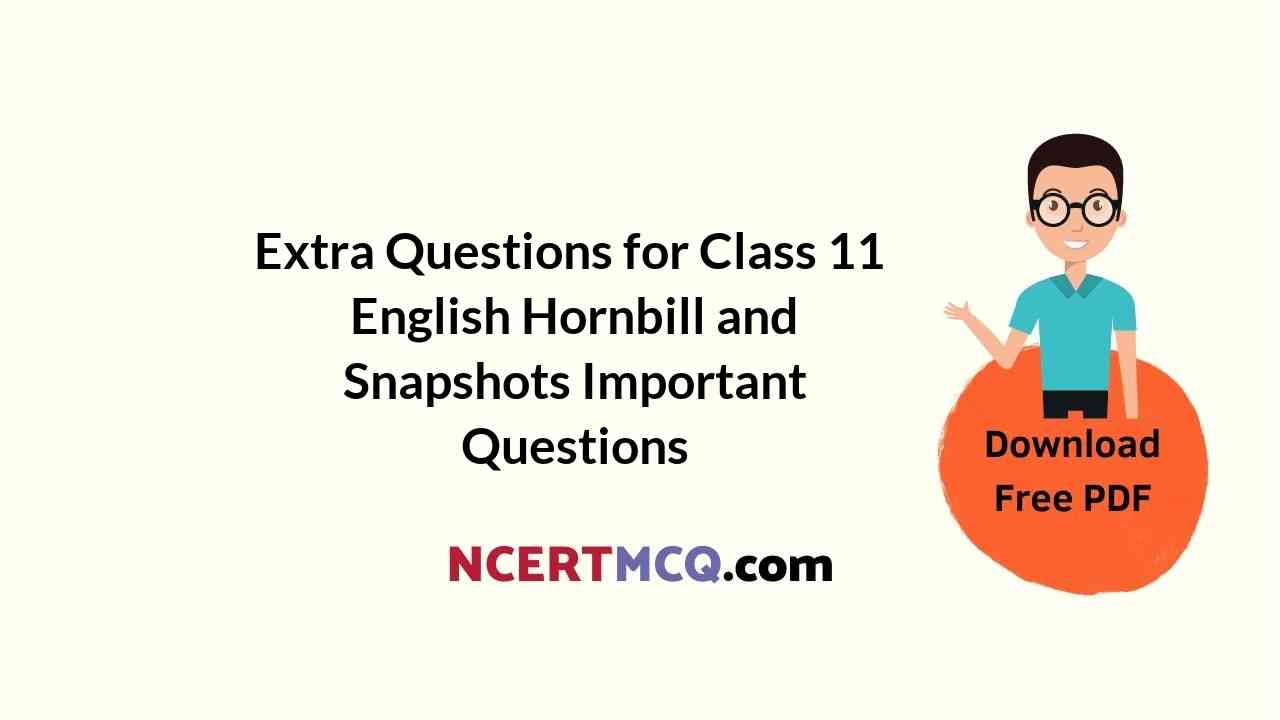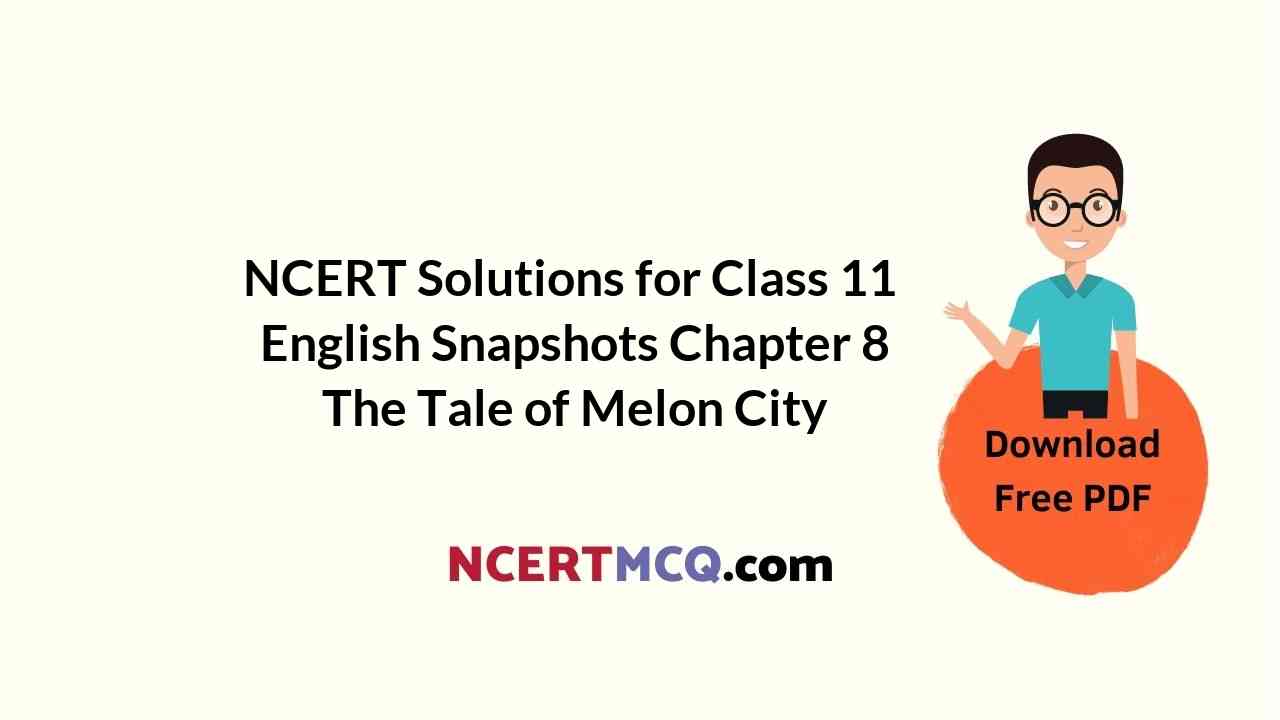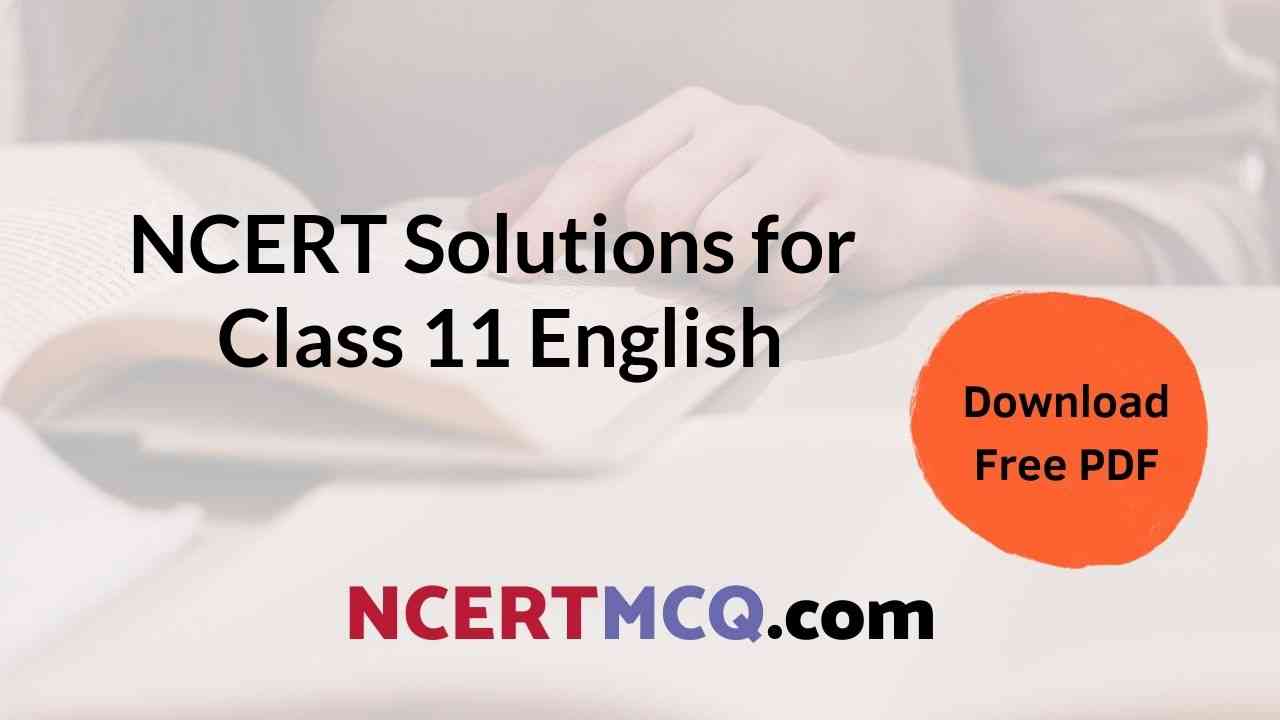
This grammar section explains English Grammar in a clear and simple way. There are example sentences to show how the language is used. Students can also read NCERT Solutions for Class 11 English to get good marks in CBSE Board Exams. https://ncertmcq.com/business-letter-class-11/
Business Letter Class 11 Format, Topics, Samples
Business Letter Class 11
1. Business Letters: Inquiries and Replies:
Question 1.
Your are Raj/Rani, living at 3, K.B. Road Delhi. You read an advertisement about an online Course in Accountancy. Through Computers, being run by Accounts Experts Institute, Patel Road, Delhi. Write a letter to the advertiser seeking all the relevent information about the course, [NCT 2018]
Answer:
3, K.B. Road
Delhi 1100XX
The Director
Accounts Experts Institute,
Patel Road,
Delhi 1100XX
Dear Sir
Subject: Course in Accountancy
This is with reference to your advertisement on line about the short term course in Accountancy offered by your institute.
Kindly let me know if your institute is recognised by any university. Further, what is the duration and the fee of this course? Please let me know if hard copies of the study material will be available along with the on line subject matter. Also, if there is a contract programme and if so, of what duration.
I shall be extremely thankful for an early response by email or by post.
With best wishes
Yours faithfully
Raj

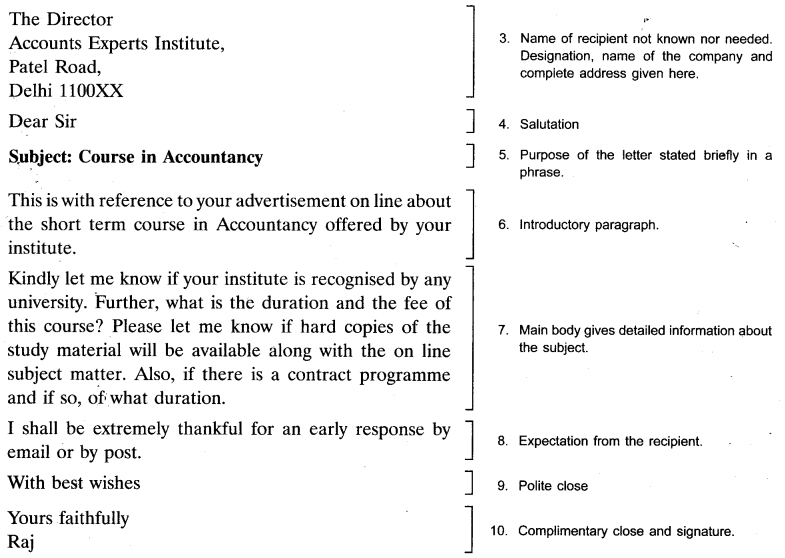
Business Letter Format Class 11 Question 2.
Your younger brother is an extremely good looking and smart kid. Your parents are considering modelling offers for him. You come across the following advertisement and find it attractive enough to make enquiries.
| Cute children required earliest for TV and magazine ad. of children’s products, soft drinks. Serial openings offered. Contact Townspeople, M-54, Greater Kailash, New Delhi |
Write a letter as the father seeking details about assignments, stating your terms and conditions and giving information about the child. Enclose photographs. Sign as Ramesh Sharma. You are living at 14, S-Block, Sector 12, Noida.
Answer:
14 S-Block
Sector 12
Noida 201XXX
11 November 20XX
The Manager
Towns people
M-54, Greater Kailash
New Delhi 1100XX
Dear Sir
Subject: Enquiry about the modelling assignment
This is in reference to your advertisement in the Times of India dated Nov. 9,20XX inviting attractive children to act as models.
My son is eight years old and is extremely good looking. He is very intelligent and cqn easily follow instructions. He is a student of class III and has taken part in many school functions. I am enclosing four photographs of my son taken from different angles. I would like him to be a model for your company.
In case you find the photographs suitable, please let me have the details of your offer.
With best wishes
Yours faithfully
Ramesh Sharma
Ends: 4 Photographs
Formal Letter Class 11 Question 3.
Write a reply to the above enquiry.
Answer:
Townspeople
M-54 Greater Kailash
New Delhi
Nov. 17, 20XX
Mr Ramesh Sharma
14 S-Block
Sector 12
Noida 201301
Dear Mr Sharma
Subject: Child Model
I thank you for your letter dated Nov. 11, 20XX and the interest you have shown in our firm. I am pleased to inform you that our panel of advertising executives thought highly of your son’s photographs. He is a very photogenic child and may serve our purpose.
To answer your query, I would like to tell you about our firm. We are a reputable ad agency and are currently handling the advertising campaign of Food and Drinks Ltd., a well-known multinational company. I suggest that you bring the child to our office next Sunday so that we may speak to him and know more about him. We shall put him through some easy exercises. In case he performs to our satisfaction, we shall make you our offer.
Please let me know if you would like to meet us on some other day. Hoping to hear from you soon.
Yours sincerely
Aakash Saxena
(Creative Manager)
Business Letters Class 11 Question 4.
You wish to buy an inverter to cope with frequent powercuts. Write a letter to Plaza Batteries, 55, Pataiiputra Road, Patna, asking them if they supply branded inverters or those manufactured in their own factory. Ask about voltage, number of batteries, expected life, guarantee, price and other relevant details.
You are Krishna Kant/Kamini living at 42, Model Town, Gaya, Bihar.
Answer:
42 Model Town
Gaya
Bihar
4 March 20XX
The Manager
Plaza Batteries
55, Pataliputra Road
Patna
Dear Sir
Subject: Enquiry about inverters
I came across your advertisement in the Patna Times of 1st March 20XX announcing the availability of inverters at your showroom. I am interested in buying one for my house.
Please let me know what voltage I will need to run four tubelights, four fans and one television. Will I need two batteries for the purpose or will one be sufficient? Let me also know if there is a guarantee or a warranty on your inverters.
The most important enquiry is regarding the brand of the inverters. Do you sell branded ones or those manufactured locally? I would also like to know the various prices and the discounts offered by you.
Kindly reply at the earliest, so that I may take a decision regarding the purchase.
Yours faithfully
Krishna Kant
Letter Writing Class 11 Question 5.
Your family has to shift from Delhi to Chennai. You need the services of a professional packing and moving company. You see the following advertisement in a newspaper.
| Decent Packers-worldwide packing, shifting, transport-road, air, sea, Insurance household/ car, door to door service. Contact Manager: 1469, D Block, Connaught Place, New Delhi. |
Write a letter to the Manager enquiring about special packing for expensive glassware, electronic goods, charges for moving your entire household goods by road and the time the goods would take to reach Chennai. Sign as Krishna Kant/Krishna Kumari. Your, address is 18 B, Self-Financing Flats, Alaknanda Colony, New Delhi.
Answer:
18B Self-Financing Flats
Alaknanda Colony
New Delhi
21 February 20XX
The Manager
Decent Packers
1469, D Block
Connaught Place
New Delhi 110001
Dear Sir
Subject: Packing and transporting household goods from Delhi to Chennai
This is with reference to your advertisement in the Times of India dated 18 th February 20XX. Kindly let me know if your company can handle my goods to my specifications.
I would like to know if you have any special packing arrangements for expensive crystalware, glassware, chandeliers and delicate porcelain items. Please let me know if you can pack electronic goods and safely transport them. Also, write what would be your charges for packing and transporting my household goods. In all, my possessions will be about one truck load. Indicate how long the goods will take to reach Chennai. On hearing from you, I shall be able to finalise my plans. Expecting an early response.
Yours faithfully
Krishna Kant
Format Of Business Letter Class 11 Question 6.
Write a reply to the above enquiry describing special packing, offering a discount if a car is also sent.
Answer:
Ref. PT/21 Feb/DC
Decent Packers
1469, D Block
Connaught Place
New Delhi 110001
1 March 20XX
Mr Krishna Kant
18-B, Self-Financing Flats
Alaknanda Colony
New Delhi 110019
Dear Sir
Subject: Transporting goods from Delhi to Chennai
I thank you for your letter dated 21st February 20XX expressing interest in the services offered by our company. I would like to assure you that we handle the job to our customer’s satisfaction. We have special thermocol packing for storing and moving glass and crystal and porcelain items. Your chandeliers will be dismantled and packed carefully and reassembled by our staff on reaching Chennai. We handle electronic items very frequently and take special care while transporting them. Our executive can visit you on a day and time convenient to you. He will give you our quotations on inspecting your household goods. We shall offer a discount of 5% if you transport your car through us.
I shall be happy to answer any further questions you may have. Please let us know when our executive may visit you to finalise the deal.
With best wishes,
Yours sincerely
Ramesh Nagpal
(Manager)
Format Of Official Letter Class 11 Question 7.
You have given a portion of your house on rent to a young man. Recently you have noticed some undesirable strangers visiting him. He is frequently out of town for days at a stretch. You are suspicious, but do not wish to go to the police. Write a letter to a private detective agency enquiring if they can undertake an investigation and their charges for the same. You should not reveal the entire situation in the letter but suggest that the investigation may have to be done outside your city also. The name of the agency is Discreet Services at 45, Ashok Nagar, Business Complex, Himalaya Plaza, Simla. Sign as Hamid Khan. Your address is R-15, Gandhi Nagar, Simla.
Answer:
R-15, Gandhi Nagar
Simla
2 May 20XX
Discreet Services
45, Ashok Nagar
Business Complex
Himalaya Plaza
Simla
Dear Sir
Subject: Enquiry about detection charges
I have come to know of your firm through some business associates who have used your services. I need your Kelp in the following matter.
Kindly let me know if you can obtain for me complete information about an individual whose activities appear suspicious to me. I must mention that the enquiry has to be absolutely confidential. You may have to go out of Simla for these inquiries. Please let me know your charges for the assignment.
Hoping for an early response.
Yours faithfully
Hamid Khan
Class 11 Official Letter Question 8.
Write a reply to the above enquiry promising secrecy in investigation and speedy result.
Answer:
Ref. Id.Per/21/XX
Discreet Services
45, Ashok Nagar
Business Complex
Himalaya Plaza
Simla
10 May 20XX
Mr. Hamid Khan
R-15, Gandhi Nagar
Simla
Sir
Subject: Your letter regarding your tenant
We thank you for your letter dated 2nd May 20XX and for the interest you have shown in our firm.
We would like to assure you that obtaining information about any individual is not difficult at all for us. We handle such cases frequently and successfully. Further, we can assure you that we will not take too long over such an assignment. However, you will have to give us some more information about the person, his photograph, if possible, and any known contacts. We shall need an advance deposit of ₹ 10,000. If no extraordinary expenses are involved, our total charges will be ₹ 25,000. We would like to assure you of our efficient services.
Awaiting instructions from you,
Yours sincerely
Avinash Kapur
Letter Class 11 Question 9.
As Avinash Aneja, Librarian of Swami Vivekanand Sr. Secondary School, Vikaspuri, Delhi, you have to buy dictionaries and encyclopaedia. Write a letter to M/s Universal Book Suppliers, 14, Gali Ram Nath, Chandni Chowk, Delhi, asking for a list of such books available with them, their publishers, special discounts for institutions, time taken for delivery and the mode of payment acceptable to them.
Answer:
Ref-U.B.S./En.Div./01/XX
Swami Vivekanand Sr. Secondary School
Vikaspuri
Delhi
10 February 20XX
M/s Universal Book Suppliers
14 Gali Ram Nath
Chandni Chowk
Delhi 110006
Dear Sir
Subject: Order for books
We are interested in ordering some dictionaries and encyclopaedia for our newly established library. We would appreciate if you could tell us about the encyclopaedia, preferably illustrated, for children of middle level. Kindly let me know if you have Websters Illustrated Junior Encyclopaedia (8 Vols.) and Oxford Dictionary (latest edition). Please send me a list of such books along with the publishers’ names and prices. We would like to know what discount you will offer to us as an institution and whether you will accept payment by cheque. Please write how much time you will take to make the delivery.
Looking forward to an early response.
Yours faithfully
Avinash Aneja
(Librarian)
Business Letter Writing Class 11 Question 10.
Write a reply to the above enquiiy giving the necessary information.
Answer:
Our Ref. s.V.s.s./d.e./01/XX
Your Ref. U.B.S./En.Div./01/XX
M/s Universal Book Suppliers
14, Gali Ram Nath
Chandni Chowk
Delhi 110006
1 March 20XX
The Librarian
Swami Vivekanand Sr. Secondary School
Vikaspuri
Delhi 1100XX
Dear Sir
Subject: Information regarding books
We thank you for your letter of 10th February 20XX and are happy to furnish the information you need.
We deal in educational books and therefore stock dictionaries and encyclopaedia brought out by Indian as well as foreign publishers. We have books for all age groups, suitable for primary, middle or senior classes. As desired by you, we are enclosing our catalogue which gives information about publishers and prices.
We shall offer you 10% discount, as given to institutions. Your books will be delivered in about two weeks’ time after we receive your order. We accept payment by demand draft only.
We hope our terms meet your approval and we receive your order soon.
Yours faithfully
R. Krishnan
(Manager)
Business Or Official Letters Class 11 Question 11.
You are Manish/Manisha Verma living at 59, Saraswati Enclave, Sector-9, Rohini. You wish to make a pilgrimage to Badrinath, Kedarnath and Haridwajr with your family of four. Write a letter to Ideal Pilgrims Tours and Travels, D 22, Connaught Place, New Delhi enquiring about the schedule of their conducted tours by deluxe buses to these places. Ask about the charges, staying and boarding arrangements and the total time needed for the tour.
Answer:
59, Saraswati Enclave
Sector 9
Rohini
Delhi 110085
5 March 20XX
The Manager
Ideal Pilgrims Tours and Travels
D 22, Connaught Place
New Delhi 110001
Dear Sir
Subject: Inquiry about the package tour
Please refer to your advertisement in the Times of India dated 3rd March 20XX where you have described the package tour to Badrinath, Kedarnath and Haridwar. I am interested in making this trip with my wife and two children. Please let me have some information regarding your package. Please let me know if you have a tour planned for middle, late October or early November. I would like-to know about the kind of boarding and lodging facilities provided by you. How much time will you provide at each of these places, and what will be the total duration of the trip? Am I entitled to student discount for my children or a group discount for the party? Please send me a brochure, if possible.
I shall book the tour with you if your terms and dates suit me.
Expecting an early response,
Yours faithfully
Manish Verma
Class 11 Official Letter Format Question 12.
Write a reply to this enquiry giving the necessary details.
Answer:
Our Ref. HBK/31/XX
Ideal Pilgrims Tours and Travels
D 22, Connaught Place
New Delhi 110001
15 March 20XX
Manish Verma
59, Saraswati Enclave
Sector 9
Rohini
Delhi 110085
Dear Sir
Subject: Information about the travel package
Thanks for the interest shown by you in our travel package. I thank you for your letter of 5th March 20XX.
The total duration of our tour to Haridwar, Badrinath and Kedarnath is of ten days-from Delhi back to Delhi. We spend two days at Haridwar, two at Badrinath and three at Kedarnath. The remaining time is taken in travelling. Our stay at each place is in the guest houses of Garhwal Vikas Nigam. The accommodation is comfortable. Two or more beds will be provided to a family according to its requirement. Food will be vegetarian. We shall provide you morning tea, breakfast, lunch and dinner. Total charges per adult will be ₹ 7,000 and for children below twelve years ₹ 5,500.
Our trips in October are beginning on 15th, 20th, 25th and 30th and in November on 4th and 9th and after every five days. I am enclosing a brochure as desired by you. We shall be happy to book your seats on any tour, provided you inform us well in advance.
Hoping to hear soon from you,
Yours faithfully
H.R. Narain
(Manager)
Enel. Brochure
Formal Letter Format Class 11 Question 13.
You are Ashok/Ashima Mathur, of 56 H Block, Ashok Vihar, Delhi-110052. You are the owner of a restaurant and wish to expand it. For this purpose you need a loan from the HDFC Bank, Pitampura, Delhi. Write to the manager enquiring about the terms and interest rates on a loan of 5 lakhs, documents to be provided and formalities to be completed.
Answer:
Our Ref. HDFC/Loan/01/XX
56 H Block
Ashok Vihar
Delhi-110052
5 March 20XX
The Manager
HDFC Bank
Pitampura
Delhi 110034
Dear Sir
Subject: Request for loan
(introductory) I am an account holder in your bank for several years, a/c no. SB 2978.
Fixed deposits of ₹ 80,000
(Main para) I intend to expand my business- I own a restaurant ‘Evening’ at Madhuban Chowk, Pitampura-turnover of t 1 lakh per month-wish to expand-construct new building-instal air conditioners-upgrade the facilities – I request you to sanction a loan of five lakhs. (Concluding)-What documents should be provided-let me know about the formalities to be completed.
(Develop these hints into full sentences.)
Yours faithfully
Ashok Mathur
2. Business Letters: Placing Orders
1. Your school, Vandana Public School, Dayanand Vihar, Chandigarh, requires some musical instruments. Write a letter to Saraswati Musical Pvt. Ltd. Shahadara placing an order for the same, on the behalf of the school principal. (120-150 words) [NCT 2018]
Answer:
Vandana Public School
Dayanand Vihar
Chandigarh 1600XX
4 April 20XX
Sarswati Musical Pvt. Ltd.
Shahdara
Delhi 1100XX
Dear Sir
Subject: Order for musical instruments
I am pleased to inform you that our meeting with your representative proved to be most satisfactory.
In consultation with our Music Department, am placing an order for the purchase of the following musical instruments.
| 1. Harmonium 2. Tabla 3. Sitar 4. Dholak |
2 piece 2 pairs 1 piece 2 piece |
Kindly arrange to have these delivered at the earliest in undamaged condition. As per our conversation. I am enclosing a cheque of ₹5000/- as advance payment. The balance will be paid on receipt of the instruments.
With best wishes
Yours faithfully
Namita Sinha
(Namita Sinha)
Enel. Cheque No. A 23456789 for ₹5000/-
Business Letter Class 11 Format Question 2.
You are Riyazzuddin/ Riya, the Secretary of your school sports club. On behalf of the school Principal, write a letter to the Sales Manager of Delhi Sports Store, Murad Nagar, placing an order for sports equipment – cricket bats, balls, volleyballs, rackets, etc. [NCT 2015]
Answer:
Kendriya Vidyalaya No. 5
Murad Nagar XXXXXX
15 January 20XX
The Sales Manager
Delhi Sports Store
Murad Nagar XXXXXX
Dear Sir
Subject: Order for Sports Equipment
I am writing to you on behalf of Mr. S. Khare, Principal, KV No.5 Murad Nagar.
We visited your store on 10 February 20XX and examined the sports equipment available with you. We would like to order the following items from your store.
1. 6 Cricket bats – full size of ‘Trail Blager’ company
2. 12 Cricket balls made by ‘Trail Blager’
3. 6 Tennis raquets, medium weight and grip made by ‘Champions’
4. 2 Volleyball nets
5. 12 Badminton raquets by ‘Champions’
As agreed upon, we would like you to deliver the equipment within a week from today.
Please find enclosed a cheque for ₹ 5000/ as advance payment. The balance will be paid on receipt of the equipment.
We hope for a satisfactory deal and that you will deliver good quality equipment within the time frame agreed upon mutually.
Thanking you
Yours faithfully
Riya
Secretary, Sports Club
Enel: Cheque no. 4560123789 for ₹ 5000/.
Question 3.
You are the manager of the restaurant ‘The Chef. Write a letter to the manager of ‘The Cottage India Emporium’ placing your order for furnishings and upholstery items for your restaurant.
Answer:
The Chef
4/3 Model Town
New Delhi 1100XX
2 March 20XX
The Manager
The Cottage India Emporium
Central Market
New Delhi 110OXX
Dear Sir
Subject: Placing order for furnishings and upholstery items
Thank you for your quotation of February 25 and the generous supply of sample along with the :
latest price list, both are well up to our expectations.
Since our requirement is urgent, kindly send the following items immediately.

We hope you will make arrangements for delivering the items latest by March 15, 20XX. The payment will be made in cash after adjusting 15% trade discount as specified by you. Further, it must be understood that we reserve the right to reject any item that does not correspond to the samples submitted.
Yours faithfully,
Hari Dutt
(Manager)
The Chef Restaurant

